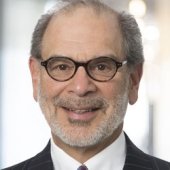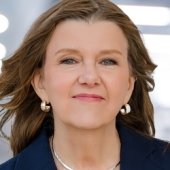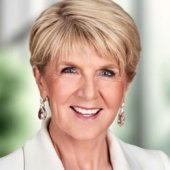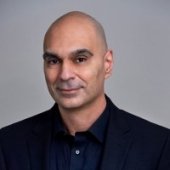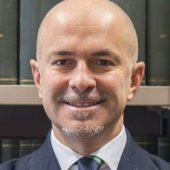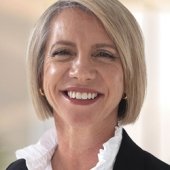African Union Development Agency CEO: Infrastructure, investment keys to continent’s future
IN BRIEF
- “We brought $800 million for feasibility studies of our pipeline projects under the Program for Infrastructure Development for Africa. More than that, $86 billion were mobilized for the construction of roads, transport, energy, water, dams, and also digital infrastructure.”
- “In our private sectors, we’re going beyond that to the ones that are outside, like Asian Business Council, the American Business Council, the Corporate Council on Africa, the European Business Councils and Chambers of Commerce, we work hand in hand with them.”
- “Africa has its own vision. Africa started believing in itself and understanding that it’s sitting on a wealth. Wealth in terms of natural resources, but also wealth in terms of human resources and capital.”
In this VISION by Protiviti interview, Joe Kornik, Editor-in-Chief of VISION by Protiviti, sits down with Nardos Bekele-Thomas, CEO of the African Union Development Agency and United Nations resident coordinator, to talk about what the continent needs to thrive in the future; namely, investment and infrastructure. Bekele-Thomas lays out her vision for the future of the continent and how both the public and private sectors will play key roles in turning Africa into a global powerhouse over the next decade and beyond.
In this interview:
1:00 – NEPAD’s big agenda
3:42 – The Program for Infrastructure Development in Africa
6:34 – Public-private collaboration opportunities
9:10 – Harnessing Africa’s people potential
African Union Development Agency CEO: Infrastructure, investment keys to continent’s future
Joe Kornik: Welcome to the VISION by Protiviti podcast. I’m Joe Kornik, Editor-in-Chief of VISION by Protiviti, our global content resource examining big themes that will impact the C-Suite and executive boardrooms worldwide. Today, we’re exploring the future of government, and we welcome in Nardos Bekele-Thomas, CEO of the African Union Development Agency, commonly known as NEPAD, the New Partnership for African Development.
Endorsed by African Union Heads of State and Government, including 33 prime ministers within Africa, Bekele-Thomas became the first woman to lead the Africa Union Development Agency when she took over two years ago. She is a powerhouse who has influenced growth and development in Africa for nearly 40 years, serving in prominent positions with governments of multiple countries, and for more than two decades with the United Nations.
Nardos, thank you so much for joining me today.
Nardos Bekele-Thomas: Thank you so much for having me, and for this opportunity to converse with you.
Kornik: Now, I know NEPAD aims to transform Africa with regional and continental priority development programs and projects. Can you highlight a few accomplishments since you took over, and then maybe talk a little bit about what’s the next big one on the agenda?
Bekele-Thomas: Yes. Thank you very much. Actually, I’ll start by saying that the NEPAD has transformed itself to being the African Union Development Agency, which is really an expanded mandate of making sure the development activities in the continent. There are many, if you go country by country, actually, development cooperation is overcrowded. The space is overcrowded. But how do you coordinate these activities and make sure that they are impactful? This is one of the mandates that was assigned to NEPAD.
Also, to identify the gaps and make sure that these gaps are filled in and that the requisite resources are mobilized for the realization of the agenda that was put in place. So NEPAD actually is really, it’s monumental, has monumental tasks and responsibilities. Therefore, I’m just humbled to being the CEO of this organization.
Now, coming to—when I came to NEPAD, of course, this whole transition took place in 2018, and 2019 being the COVID year, we have to subtract like two years of our time. The two years were really more into COVID and responding to the challenges of COVID. Therefore, in reality, the operationalization of the African Union Development Agency came into effect with my coming into this position in 2022.
Since then, the first thing that came to my mind is, if Africans coordinate its activities, its development cooperation, its development activities at national, regional, and continental level, then we need to have a common framework. We need to have a plan. Therefore, the first thing that we started doing is the review of the 10-year implementation plan. How are we fairing? How did we perform? Where did we go wrong? What are the best practices and how can we build on the best practices but also address the deficiencies? Then, come out with the design of the second 10-year implementation plan.
In terms of infrastructure, which is the bedrock of African integration and industrialization, we had a big conference in Dakar last year in February. This conference was different from the conferences we used to have before. In the past, we used to have politicians come, ministers or whatever, and make statements after statements, commitments after commitments, and sometimes they still remain to be unfulfilled promises. Therefore, we wanted it to be different.
We brought the program owners—these are countries, of course, the project owners—but we brought also the development finance institutions that could do a guarantee fund, that could come out with guaranteed funds, and also the private sector and investors together. We had the rules project by project, we brought them and went into deeper discussions and understanding. This yielded concrete result to the surprise of so many. We brought $800 million for feasibility studies of our pipeline projects under the Program for Infrastructure Development for Africa. More than that, the $86 billion were mobilized for the construction of roads, transport, energy, water, dams and all this, and also on digital infrastructure.
Kornik: You mentioned infrastructure, which I think is interesting. I know that’s one of the priority areas, and I think there’s eight priority areas that you focus on among others of course. Those are, I guess, political, economic and corporate governance, agriculture, infrastructure as we mentioned, education, health, science and technology, market access and tourism, and the environment. I’m just curious what are the biggest priorities for governments in Africa to better serve their citizens? I mean, what are the biggest ones that you need to address?
Bekele-Thomas: All of them are important. I truly believe that we need to do everything. We can do that if we come out with catalytic approaches, catalytic programs, because these programs are intertwined and they can bring all the different sectors together. For us, for example, what we have chosen for the coming five years is infrastructure is very important.
Kornik: You’ve touched on this a little bit in your some of your answers, but can you talk to me a little bit about how the public and private sector companies either inside or outside Africa even can collaborate and work together to move Africa forward?
Bekele-Thomas: Thank you very much. I think this has been really one of my, should I say forte, but I’ve been dealing with the private sector in my past in the UN, that’s an area where I have been working, and I think it’s so critical. No one country can do this alone, and we need all the support that we require. Especially the private sector because they have—it’s taking all this, the development of country or the development of the continent in general, it will offer them more opportunities to expand their businesses so the public-private partnership is critical.
Today, I just finished—actually this morning—a meeting with the Indonesian government where—when I was in Bali for the G20 last year, it was very interesting to see how the private sector and the public sector work hand in hand, and we were having discussions with them. Therefore beyond, also, in our private sectors, we’re going beyond that to the ones that are outside, like Asian Business Council, the American Business Council, the Corporate Council on Africa, the European Business Councils and Chambers of Commerce, we work hand in hand with them. Especially in investment, when we talk about infrastructure. I mean, we really need this.
We need them also to team up with African investors so that together, they build equity and they meet the challenges that Africa has to offer. It’s not a challenge actually. It’s a big opportunity, it’s a huge potential. I think working hand in hand, we can perfect the conducive environment, the environment that they require to thrive, but also make sure that investment flows are smooth and directed in the growth areas that are identified by Africa.
Kornik: Right. That investment is so key, obviously. I’m going to zoom out a little bit and take a 30,000 foot view here and talk a little bit about the continent itself in the future. It is the fastest growing population of any continent on Earth. By 2050, the UN estimates one fourth of all people on the planet will live in Africa. My question is, how can African governments navigate that rapid growth and are there ways that countries can collaborate to help lift the entire continent as it goes through this next two-to-three decade rapid growth period?
Bekele-Thomas: Africa is showing confidence in itself for the first time. You go to the G20, you go to the COP, you go everywhere, Africa is standing, Africa is talking, Africa is taking a space, which it didn’t do before. Therefore, that is foundational, it’s fundamental, and I’m glad that is happening. The second thing that is very important and clear is that Africa has its own vision. Africa started believing in itself and understanding that it’s sitting on a wealth. Wealth in terms of natural resources, but wealth in terms of the human resources and capital.
Therefore, I think for Africans, this is really a time to build on this confidence level and implement the programs that would make them be the powerhouse, the global powerhouse, which I am sure and I am so confident. When I am sitting with heads of states, when I am sitting in the EU Summit, I see so much, so much energy that I leave inspired but also encouraged. We hope that the rest of the world will support us in making the dream, the African dream to be a reality.
Kornik: Well, Nardos, thank you so much for joining me today. I really appreciate the time and the conversation.
Bekele-Thomas: Thank you so much. Much appreciated.
Kornik: Thank you for listening to the VISION by Protiviti podcast. Please rate and subscribe wherever you listen to podcasts, and be sure to visit vision.protiviti.com to view all of our latest content. Until next time, I’m Joe Kornik.
Did you enjoy this content? For more like this, subscribe to the VISION by Protiviti newsletter.


